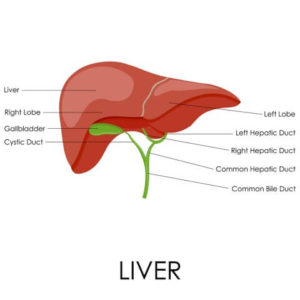Hepatitis C Education
What is hepatitis C?
What is the liver?
The liver is an organ that does many important things.

The liver:
- removes harmful chemicals from your blood
- fights infection
- helps digest food
- stores nutrients and vitamins
- stores energy
You cannot live without a liver.
What causes hepatitis C?
Who gets hepatitis C?
Anyone can get hepatitis C, but some people are at higher risk, including:
- people who were born to a mother with hepatitis C
- people who have had more than one sex partner in the last 6 months or have a history of sexually transmitted disease
- people who had a blood transfusion or organ transplant before July 1992
- people with hemophilia who received blood products before 1987
- people who have used illegal injection drugs
It is recommended that anyone with these risk factors should at least be tested once in their lifetime.
How could I get hepatitis C?
You could get hepatitis C through contact with an infected person’s blood, semen, or other body fluid. You could get hepatitis C from:
- being born to a mother with hepatitis C
- having sex with an infected person
- being tattooed or pierced with unsterilized tools that were used on an infected person
- getting an accidental needle stick with a needle that was used on an infected person
- using an infected person’s razor or toothbrush
- sharing drug needles with an infected person
You cannot get hepatitis C from:
- shaking hands with an infected person
- hugging an infected person
- sitting next to an infected person
What are the symptoms of hepatitis C?
Most people have no symptoms until the virus causes liver damage, which can take 10 or more years to happen. Others have one or more of the following symptoms:
- yellowish eyes and skin, called jaundice
- a longer than usual amount of time for bleeding to stop
- swollen stomach or ankles
- easy bruising
- tiredness
- upset stomach
- fever
- loss of appetite
- diarrhea
- light-colored stools
- dark yellow urine
What is chronic hepatitis C?
Hepatitis C is chronic when the body can’t get rid of the hepatitis C virus. Although some people clear the virus from their bodies in a few months, most hepatitis C infections become chronic. Without treatment, chronic hepatitis C can cause scarring of the liver, called cirrhosis; liver cancer; and liver failure.
Symptoms of cirrhosis include:
- yellowish eyes and skin, called jaundice
- a longer than usual amount of time for bleeding to stop
- swollen stomach or ankles
- tiredness
- nausea
- weakness
- loss of appetite
- weight loss
- spiderlike blood vessels, called spider angiomas, that develop on the skin
How is hepatitis C diagnosed?
How is hepatitis C treated?
Drugs for the Treatment of Chronic Hepatitis C
Liver Transplantation
How can I avoid getting hepatitis C?
You can protect yourself and others from hepatitis C if you:
- do not share drug needles
- wear gloves if you have to touch another person’s blood
- use a condom during sex
- do not borrow another person’s toothbrush, razor, or anything else that could have blood on it
- make sure any tattoos or body piercings you get are done with sterile tools
- do not donate blood or blood products if you have hepatitis C
What should I do if I think I have been exposed to the hepatitis C virus?
Points to Remember
- Hepatitis C is a liver disease caused by the hepatitis C virus.
- Anyone can get hepatitis C, but some people are at higher risk.
- You could get hepatitis C through contact with an infected person’s blood.
- Hepatitis C is chronic when the body can’t get rid of the hepatitis C virus.
- Liver damage can take 10 or more years to happen and is often the first sign of hepatitis C.
- Get tested if you are at higher risk or think you may have been exposed to the hepatitis C virus. Many people do not know they are infected.
- Chronic hepatitis C is now easily treated with all oral drugs that clear the virus causing complete cure!
Hope through Research
The National Institute of Diabetes and Digestive and Kidney Diseases (NIDDK) supports basic and clinical research into many digestive disorders, including hepatitis C.
Participants in clinical trials can play a more active role in their own health care, gain access to new research treatments before they are widely available, and help others by contributing to medical research. For information about current studies, visit
Pronunciation Guide
angiomas (an-jee-OH-muhs)
biopsy (BY-op-see)
chronic (KRON-ik)
cirrhosis (sur-ROH-siss)
hepatitis (HEP-uh-TY-tiss)
inflammation (IN-fluh-MAY-shuhn)
jaundice (JAWN-diss)
peginterferon (PEG-IN-tur-FIHR-on)
ribavirin (RY-buh-VY-rin)
virus (VY-ruhss)
For More Information
Fact sheets about Hepatitis C and other conditions are available from the American Liver Foundation at www.liverfoundation.org/abouttheliver/info






